Downloadable Resources
Access helpful resources that you can take with you on the go. If you need translation support, call OneSource™ at 1-888-765-47471-888-765-4747.

Access helpful resources that you can take with you on the go. If you need translation support, call OneSource™ at 1-888-765-47471-888-765-4747.
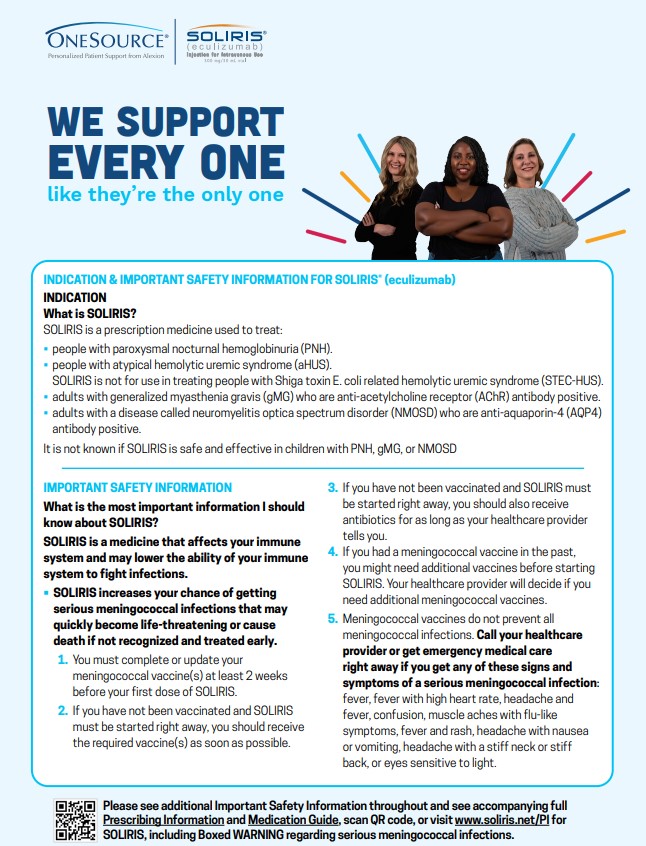
Discover information about OneSource™ patient services, including financial assistance, comprehensive vaccination support, frequently asked questions, and more to help you be better prepared for your treatment journey.
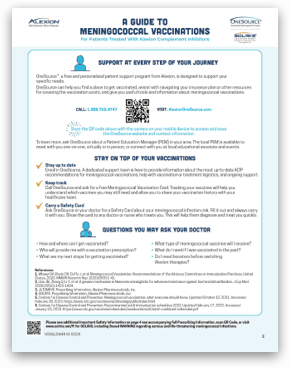
Learn why, how, and when to get vaccinated when starting or while receiving SOLIRIS® (eculizumab) treatment. This guide also includes questions you may want to ask your healthcare provider, along with resources for finding the vaccines you need nearby.
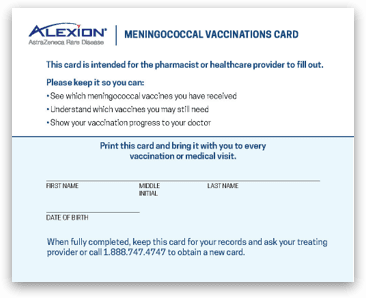
Keep track of your meningococcal vaccines by printing this important card and sharing it with your healthcare providers.
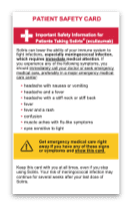
The Patient Safety Card is about the risk of meningococcal infection. Fill out this card and carry it with you at all times. It is important to show it to any doctor or nurse who treats you. This will help them diagnose and treat you quickly.
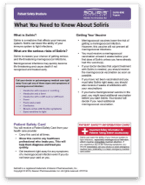
Download a brochure that explains important information you need to know about SOLIRIS, including guidance on how to use your Patient Safety Card.

Read this helpful guide to understanding the insurance process for getting on treatment and learn about access support options available to those who have been prescribed SOLIRIS.
Find additional tools and resources that can assist you with staying on top of your condition.
Dive into a collection of children's stories created by Alexion to help you explain living with a rare disease to your loved ones.
INDICATIONS & IMPORTANT SAFETY
INFORMATION FOR SOLIRIS®
(eculizumab)
What is the most important information I should know about SOLIRIS?
SOLIRIS is a medicine that affects your immune system and may lower the ability of your immune system to fight infections.
SOLIRIS increases your chance of getting serious meningococcal infections that may quickly become life-threatening or cause death if not recognized and treated early.
What is SOLIRIS?
SOLIRIS is a prescription medicine used to treat:
people with paroxysmal nocturnal hemoglobinuria (PNH).
people with atypical hemolytic uremic syndrome (aHUS).
SOLIRIS is not for use in treating people with Shiga toxin E. coli related hemolytic uremic syndrome (STEC-HUS).
people 6 years of age and older with generalized myasthenia gravis (gMG) who are anti-acetylcholine receptor (AChR) antibody positive.
adults with a disease called neuromyelitis optica spectrum disorder (NMOSD) who are anti-aquaporin-4 (AQP4) antibody positive.
It is not known if SOLIRIS is safe and effective in children with PNH, or NMOSD.
It is not known if SOLIRIS is safe and effective in children with gMG below 6 years of age.
Your healthcare provider will give you a Patient Safety Card about the risk of serious meningococcal infection. Carry it with you at all times during treatment and for 3 months after your last dose of SOLIRIS. Your risk of meningococcal infection may continue for several weeks after your last dose of SOLIRIS. It is important to show this card to any healthcare provider who treats you. This will help them diagnose and treat you quickly.
SOLIRIS is only available through a program called the ULTOMIRIS and SOLIRIS Risk Evaluation and Mitigation Strategy (REMS). Before you can receive SOLIRIS, your healthcare provider must: enroll in the REMS program; counsel you about the risk of serious meningococcal infections; give you information about the signs and symptoms of serious meningococcal infection; make sure that you are vaccinated against serious infections caused by meningococcal bacteria, and that you receive antibiotics if you need to start SOLIRIS right away and you are not up to date on your vaccines; give you a Patient Safety Card about your risk of meningococcal infection.
SOLIRIS may also increase the risk of other types of serious infections, including Streptococcus pneumoniae, Haemophilus influenzae, and Neisseria gonorrhoeae. Your child should receive vaccines against Streptococcus pneumoniae and Haemophilus influenzae type b (Hib) if treated with SOLIRIS. Certain people may be at risk of serious infections with gonorrhea. Certain fungal infections (Aspergillus) may occur if you take SOLIRIS and have a weak immune system or a low white blood cell count.
Who should not receive SOLIRIS?
Do not receive SOLIRIS if you have a serious meningococcal infection when you are starting SOLIRIS.
Before you receive SOLIRIS, tell your healthcare provider about all of your medical conditions, including if you: have an infection or fever, are pregnant or plan to become pregnant, and are breastfeeding or plan to breastfeed. It is not known if SOLIRIS will harm your unborn baby or if it passes into your breast milk.
Tell your healthcare provider about all the vaccines you receive and medicines you take, including prescription and over-the-counter medicines, vitamins, and herbal supplements which could affect your treatment.
If you have PNH, your healthcare provider will need to monitor you closely for at least 8 weeks after stopping SOLIRIS. Stopping treatment with SOLIRIS may cause breakdown of your red blood cells due to PNH. Symptoms or problems that can happen due to red blood cell breakdown include: drop in the number of your red blood cell count, drop in your platelet count, confusion, kidney problems, blood clots, difficulty breathing, and chest pain.
If you have aHUS, your healthcare provider will need to monitor you closely during and for at least 12 weeks after stopping SOLIRIS for signs of worsening aHUS symptoms or problems related to abnormal clotting (thrombotic microangiopathy). Symptoms or problems that can happen with abnormal clotting may include: stroke, confusion, seizure, chest pain (angina), difficulty breathing, kidney problems, swelling in arms or legs, and a drop in your platelet count.
What are the possible side effects of SOLIRIS?
SOLIRIS can cause serious side effects including serious infusion-related reactions. Tell your healthcare provider or nurse right away if you get any of these symptoms during your SOLIRIS infusion: chest pain, trouble breathing or shortness of breath, swelling of your face, tongue, or throat, and feel faint or pass out. If you have an infusion-related reaction to SOLIRIS, your healthcare provider may need to infuse SOLIRIS more slowly, or stop SOLIRIS.
The most common side effects in people with PNH treated with SOLIRIS include: headache, pain or swelling of your nose or throat (nasopharyngitis), back pain, and nausea.
The most common side effects in people with aHUS treated with SOLIRIS include: headache, diarrhea, high blood pressure (hypertension), common cold (upper respiratory infection), stomach-area (abdominal) pain, vomiting, pain or swelling of your nose or throat (nasopharyngitis), low red blood cell count (anemia), cough, swelling of legs or feet (peripheral edema), nausea, urinary tract infections, and fever.
The most common side effects in people with gMG treated with SOLIRIS include: muscle and joint (musculoskeletal) pain.
The most common side effects in people with NMOSD treated with SOLIRIS include: common cold (upper respiratory infection), pain or swelling of your nose or throat (nasopharyngitis), diarrhea, back pain, dizziness, flu like symptoms (influenza) including fever, headache, tiredness, cough, sore throat, and body aches, joint pain (arthralgia), throat irritation (pharyngitis), and bruising (contusion).
Tell your healthcare provider about any side effect that bothers you or that does not go away. These are not all the possible side effects of SOLIRIS. For more information, ask your healthcare provider or pharmacist. Call your healthcare provider for medical advice about side effects. You may report side effects to FDA at 1-800-FDA-10881-800-FDA-1088.
Please see the full Prescribing Information and Medication Guide for SOLIRIS, including Boxed WARNING regarding serious meningococcal infections.
What is the most important information I should know about SOLIRIS?
SOLIRIS is a medicine that affects your immune system and may lower the ability of your immune system to fight infections.
SOLIRIS increases your chance of getting serious meningococcal infections that may quickly become life-threatening or cause death if not recognized and treated early.
Your healthcare provider will give you a Patient Safety Card about the risk of serious meningococcal infection. Carry it with you at all times during treatment and for 3 months after your last dose of SOLIRIS. Your risk of meningococcal infection may continue for several weeks after your last dose of SOLIRIS. It is important to show this card to any healthcare provider who treats you. This will help them diagnose and treat you quickly.
SOLIRIS is only available through a program called the ULTOMIRIS and SOLIRIS Risk Evaluation and Mitigation Strategy (REMS). Before you can receive SOLIRIS, your healthcare provider must: enroll in the REMS program; counsel you about the risk of serious meningococcal infections; give you information about the signs and symptoms of serious meningococcal infection; make sure that you are vaccinated against serious infections caused by meningococcal bacteria, and that you receive antibiotics if you need to start SOLIRIS right away and you are not up to date on your vaccines; give you a Patient Safety Card about your risk of meningococcal infection.
SOLIRIS may also increase the risk of other types of serious infections, including Streptococcus pneumoniae, Haemophilus influenzae, and Neisseria gonorrhoeae. Your child should receive vaccines against Streptococcus pneumoniae and Haemophilus influenzae type b (Hib) if treated with SOLIRIS. Certain people may be at risk of serious infections with gonorrhea. Certain fungal infections (Aspergillus) may occur if you take SOLIRIS and have a weak immune system or a low white blood cell count.
Who should not receive SOLIRIS?
Do not receive SOLIRIS if you have a serious meningococcal infection when you are starting SOLIRIS.
Before you receive SOLIRIS, tell your healthcare provider about all of your medical conditions, including if you: have an infection or fever, are pregnant or plan to become pregnant, and are breastfeeding or plan to breastfeed. It is not known if SOLIRIS will harm your unborn baby or if it passes into your breast milk.
Tell your healthcare provider about all the vaccines you receive and medicines you take, including prescription and over-the-counter medicines, vitamins, and herbal supplements which could affect your treatment.
If you have PNH, your healthcare provider will need to monitor you closely for at least 8 weeks after stopping SOLIRIS. Stopping treatment with SOLIRIS may cause breakdown of your red blood cells due to PNH. Symptoms or problems that can happen due to red blood cell breakdown include: drop in the number of your red blood cell count, drop in your platelet count, confusion, kidney problems, blood clots, difficulty breathing, and chest pain.
If you have aHUS, your healthcare provider will need to monitor you closely during and for at least 12 weeks after stopping SOLIRIS for signs of worsening aHUS symptoms or problems related to abnormal clotting (thrombotic microangiopathy). Symptoms or problems that can happen with abnormal clotting may include: stroke, confusion, seizure, chest pain (angina), difficulty breathing, kidney problems, swelling in arms or legs, and a drop in your platelet count.
What are the possible side effects of SOLIRIS?
SOLIRIS can cause serious side effects including serious infusion-related reactions. Tell your healthcare provider or nurse right away if you get any of these symptoms during your SOLIRIS infusion: chest pain, trouble breathing or shortness of breath, swelling of your face, tongue, or throat, and feel faint or pass out. If you have an infusion-related reaction to SOLIRIS, your healthcare provider may need to infuse SOLIRIS more slowly, or stop SOLIRIS.
The most common side effects in people with PNH treated with SOLIRIS include: headache, pain or swelling of your nose or throat (nasopharyngitis), back pain, and nausea.
The most common side effects in people with aHUS treated with SOLIRIS include: headache, diarrhea, high blood pressure (hypertension), common cold (upper respiratory infection), stomach-area (abdominal) pain, vomiting, pain or swelling of your nose or throat (nasopharyngitis), low red blood cell count (anemia), cough, swelling of legs or feet (peripheral edema), nausea, urinary tract infections, and fever.
The most common side effects in people with gMG treated with SOLIRIS include: muscle and joint (musculoskeletal) pain.
The most common side effects in people with NMOSD treated with SOLIRIS include: common cold (upper respiratory infection), pain or swelling of your nose or throat (nasopharyngitis), diarrhea, back pain, dizziness, flu like symptoms (influenza) including fever, headache, tiredness, cough, sore throat, and body aches, joint pain (arthralgia), throat irritation (pharyngitis), and bruising (contusion).
Tell your healthcare provider about any side effect that bothers you or that does not go away. These are not all the possible side effects of SOLIRIS. For more information, ask your healthcare provider or pharmacist. Call your healthcare provider for medical advice about side effects. You may report side effects to FDA at 1-800-FDA-10881-800-FDA-1088.
What is SOLIRIS?
SOLIRIS is a prescription medicine used to treat:
people with paroxysmal nocturnal hemoglobinuria (PNH).
people with atypical hemolytic uremic syndrome (aHUS).
SOLIRIS is not for use in treating people with Shiga toxin E. coli related hemolytic uremic syndrome (STEC-HUS).
people 6 years of age and older with generalized myasthenia gravis (gMG) who are anti-acetylcholine receptor (AChR) antibody positive.
adults with a disease called neuromyelitis optica spectrum disorder (NMOSD) who are anti-aquaporin-4 (AQP4) antibody positive.
It is not known if SOLIRIS is safe and effective in children with PNH, or NMOSD.
It is not known if SOLIRIS is safe and effective in children with gMG below 6 years of age.
Please see the full Prescribing Information and Medication Guide for SOLIRIS, including Boxed WARNING regarding serious meningococcal infections.
INDICATIONS
What is SOLIRIS?
SOLIRIS is a prescription medicine used to treat:
people with paroxysmal nocturnal hemoglobinuria (PNH).
people with atypical hemolytic uremic syndrome (aHUS).
SOLIRIS is not for use in treating people with Shiga toxin E. coli related hemolytic uremic syndrome (STEC-HUS).
people 6 years of age and older with generalized myasthenia gravis (gMG) who are anti-acetylcholine receptor (AChR) antibody positive.
adults with a disease called neuromyelitis optica spectrum disorder (NMOSD) who are anti-aquaporin-4 (AQP4) antibody positive.
It is not known if SOLIRIS is safe and effective in children with PNH, or NMOSD.
It is not known if SOLIRIS is safe and effective in children with gMG below 6 years of age.
INDICATIONS & IMPORTANT SAFETY
INFORMATION FOR SOLIRIS®
(eculizumab)
What is the most important information I should know about SOLIRIS?
SOLIRIS is a medicine that affects your immune system and may lower the ability of your immune system to fight infections.
SOLIRIS increases your chance of getting serious meningococcal infections that may quickly become life-threatening or cause death if not recognized and treated early.
Your healthcare provider will give you a Patient Safety Card about the risk of serious meningococcal infection. Carry it with you at all times during treatment and for 3 months after your last dose of SOLIRIS. Your risk of meningococcal infection may continue for several weeks after your last dose of SOLIRIS. It is important to show this card to any healthcare provider who treats you. This will help them diagnose and treat you quickly.
SOLIRIS is only available through a program called the ULTOMIRIS and SOLIRIS Risk Evaluation and Mitigation Strategy (REMS). Before you can receive SOLIRIS, your healthcare provider must: enroll in the REMS program; counsel you about the risk of serious meningococcal infections; give you information about the signs and symptoms of serious meningococcal infection; make sure that you are vaccinated against serious infections caused by meningococcal bacteria, and that you receive antibiotics if you need to start SOLIRIS right away and you are not up to date on your vaccines; give you a Patient Safety Card about your risk of meningococcal infection.
SOLIRIS may also increase the risk of other types of serious infections, including Streptococcus pneumoniae, Haemophilus influenzae, and Neisseria gonorrhoeae. Your child should receive vaccines against Streptococcus pneumoniae and Haemophilus influenzae type b (Hib) if treated with SOLIRIS. Certain people may be at risk of serious infections with gonorrhea. Certain fungal infections (Aspergillus) may occur if you take SOLIRIS and have a weak immune system or a low white blood cell count.
Who should not receive SOLIRIS?
Do not receive SOLIRIS if you have a serious meningococcal infection when you are starting SOLIRIS.
Before you receive SOLIRIS, tell your healthcare provider about all of your medical conditions, including if you: have an infection or fever, are pregnant or plan to become pregnant, and are breastfeeding or plan to breastfeed. It is not known if SOLIRIS will harm your unborn baby or if it passes into your breast milk.
Tell your healthcare provider about all the vaccines you receive and medicines you take, including prescription and over-the-counter medicines, vitamins, and herbal supplements which could affect your treatment.
If you have PNH, your healthcare provider will need to monitor you closely for at least 8 weeks after stopping SOLIRIS. Stopping treatment with SOLIRIS may cause breakdown of your red blood cells due to PNH. Symptoms or problems that can happen due to red blood cell breakdown include: drop in the number of your red blood cell count, drop in your platelet count, confusion, kidney problems, blood clots, difficulty breathing, and chest pain.
If you have aHUS, your healthcare provider will need to monitor you closely during and for at least 12 weeks after stopping SOLIRIS for signs of worsening aHUS symptoms or problems related to abnormal clotting (thrombotic microangiopathy). Symptoms or problems that can happen with abnormal clotting may include: stroke, confusion, seizure, chest pain (angina), difficulty breathing, kidney problems, swelling in arms or legs, and a drop in your platelet count.
What are the possible side effects of SOLIRIS?
SOLIRIS can cause serious side effects including serious infusion-related reactions. Tell your healthcare provider or nurse right away if you get any of these symptoms during your SOLIRIS infusion: chest pain, trouble breathing or shortness of breath, swelling of your face, tongue, or throat, and feel faint or pass out. If you have an infusion-related reaction to SOLIRIS, your healthcare provider may need to infuse SOLIRIS more slowly, or stop SOLIRIS.
The most common side effects in people with PNH treated with SOLIRIS include: headache, pain or swelling of your nose or throat (nasopharyngitis), back pain, and nausea.
The most common side effects in people with aHUS treated with SOLIRIS include: headache, diarrhea, high blood pressure (hypertension), common cold (upper respiratory infection), stomach-area (abdominal) pain, vomiting, pain or swelling of your nose or throat (nasopharyngitis), low red blood cell count (anemia), cough, swelling of legs or feet (peripheral edema), nausea, urinary tract infections, and fever.
The most common side effects in people with gMG treated with SOLIRIS include: muscle and joint (musculoskeletal) pain.
The most common side effects in people with NMOSD treated with SOLIRIS include: common cold (upper respiratory infection), pain or swelling of your nose or throat (nasopharyngitis), diarrhea, back pain, dizziness, flu like symptoms (influenza) including fever, headache, tiredness, cough, sore throat, and body aches, joint pain (arthralgia), throat irritation (pharyngitis), and bruising (contusion).
Tell your healthcare provider about any side effect that bothers you or that does not go away. These are not all the possible side effects of SOLIRIS. For more information, ask your healthcare provider or pharmacist. Call your healthcare provider for medical advice about side effects. You may report side effects to FDA at 1-800-FDA-10881-800-FDA-1088.
INDICATIONS & IMPORTANT SAFETY
INFORMATION FOR SOLIRIS®
(eculizumab)
What is the most important information I should know about SOLIRIS?
SOLIRIS is a medicine that affects your immune system and may lower the ability of your immune system to fight infections.
SOLIRIS increases your chance of getting serious meningococcal infections that may quickly become life-threatening or cause death if not recognized and treated early.
What is SOLIRIS?
SOLIRIS is a prescription medicine used to treat:
people with paroxysmal nocturnal hemoglobinuria (PNH).
people with atypical hemolytic uremic syndrome (aHUS).
SOLIRIS is not for use in treating people with Shiga toxin E. coli related hemolytic uremic syndrome (STEC-HUS).
people 6 years of age and older with generalized myasthenia gravis (gMG) who are anti-acetylcholine receptor (AChR) antibody positive.
adults with a disease called neuromyelitis optica spectrum disorder (NMOSD) who are anti-aquaporin-4 (AQP4) antibody positive.
It is not known if SOLIRIS is safe and effective in children with PNH, or NMOSD.
It is not known if SOLIRIS is safe and effective in children with gMG below 6 years of age.